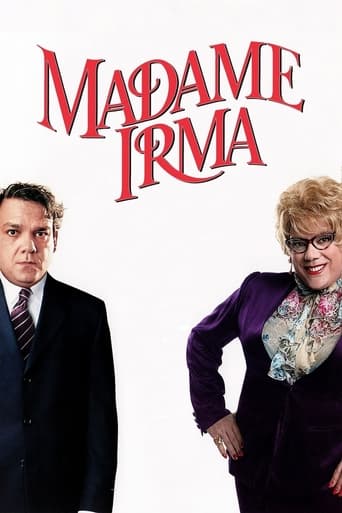ElMaruecan82
"Madame Irma" is a social comedy, or at least, tries to be. Between two chuckles, we're supposed to nod our head with compassionate eyes and utter comments such "life is tough", "it's all about money", "no wonder there are criminals" etc. That's the thoughts Didier Bourdon's film begs you to have yet surrendering to such predictable plot elements that it is the height of irony a movie about a fortune teller couldn't predict its own failure.The intent of the script is noble as it tackles serious issues like unemployment, poverty that can strike anybody, and the desperate tricks a forty-something man must pull to maintain the standard of life on which he built his marital and social life on. And having a personal affection for Didier Bourdon based on his comical and socially accurate work with Pascal Légitimus and Bernard Campan in the 90's when they formed the popular "Unknown" trio, I believe he sincerely wanted to warn us to never think our wealth for granted and expect liberalism's ticking bomb to take us out of our zone of comfort at any time. But anyone slightly familiar with movies is liable to have a déjà vu with "Madame Irma".Indeed, in 1991, Gérard Jugnot made "A Wonderful Era", a powerful drama about a middle-aged man named Gerbier who lost his job but kept hiding the truth from his Spanish wife and her kids. Being an average man with average looks, he embodied the notion that a jobless man is half one, because there's more than money at stakes, there's dignity and a beautiful woman. Many crisis' comedies often center on remarried men as to reinforce their aptitude to failure and money troubles; Francis Veber's "The Closet" had a similar protagonist played by Daniel Auteuil, but while in "A Wonderful Era", Gerbier leaves the house and discovers the world of poverty, resourcefulness and solidarity (or lack of), in "The Closet", Auteuil pretends to be a homosexual in order to keep his job.Now, these were interesting premises, and "Madame Irma" takes a path that could have been acceptable if handled in a smarter, or more original or at least funnier way. When Francis (Didier Bourdon) is fired, he has a discussion with his wife and her reaction seems to imply that any young and beautiful foreign woman (she's Spanish too) wouldn't handle the truth… and you know what, maybe it's true, but that says a lot about the basis of this marriage: either she's a trophy wife or Francis should have told the truth. Apparently, he has no other choice than lie and pretends he's been promoted and will work in London as financial director. And after days of wandering Paris' streets and getting negative replies for his applications, he desperately knocks at the door of a fortune teller.Of course, she is dressed like a gypsy woman with an obvious phony accent, still, I must admit the interchange starts in a very funny way as she tries to guess the problem by enumerating things until she gets the proper reaction, but once Francis gives one ironic answer too many, she immediately gets sour and throws him off out of the van in such an aggressive way, it felt overly brutal even in the context of the film. Her meanness could have been canceled by a funny line but when Francis is asked by the next customer about how good she is, the line falls lamentably flat. The only point of the scene seems to push Francis to play the gypsy part and the film becomes like the first act of "A Wonderful Era" dragging for an hour till the second act of "The Closet" is played, combined with "Mrs. Doubtfire".Indeed, the film is like a strange mixture of plot elements that have been seen before and the result feels severely undercooked. We laugh at a few one-liners, the relationship between Francis and Ludovic is enjoyable because he's played by his old accomplice Légitimus, but the movie never tries to go beyond the predictability of its material, a pity from a film involving the men who could so accurately mock French society in their prime. Even in the predictable corporate start with Mrs. O'Brian as the ruthless CEO whose motto is "No Pain. No Gain", we know there's a firing scene coming, but the scene doesn't work on the comedic, nor dramatic effect, it just 'happens'. The film is in a hurry to get to the drag part at the expense of characterization, apart from Francis, we care about nobody.And we don't care about his business either because instead of plunging us in the world of clairvoyance, as a 'science', a business or a scam, like teaching us some techniques and have a few real situations act like a test, instead of showing to which extent people are pushed in order to appeal to crystal-gazing, the film is just "Mrs. Doubtfire" predicting the future, it even has the obligatory wig-trials montage that doesn't even try to be funny, it's desperately banal and even Bourdon seems to believe it. The little twist is that Francis is good from the start despite some awkward moments and he immediately gets a solid reputation. But the film doesn't try to shake its material, to provide any form of emotional bond between Francis and his own creation, which is surprisingly believable. It's all about the moment when the reputation will spread to his friends and his wife so she knows the truth, and we can move forward toward the obligatory happy ending.As a result, if "The Closet" was meant as a farce but it had a few statements to make about homophobia and "A Wonderful Era" was a drama that worked on a strong tragicomic level , "Madame Irma" is a comedy that has nothing to say, or a social commentary without any soul. As a fan of Bourdon, I was twice disappointed.


